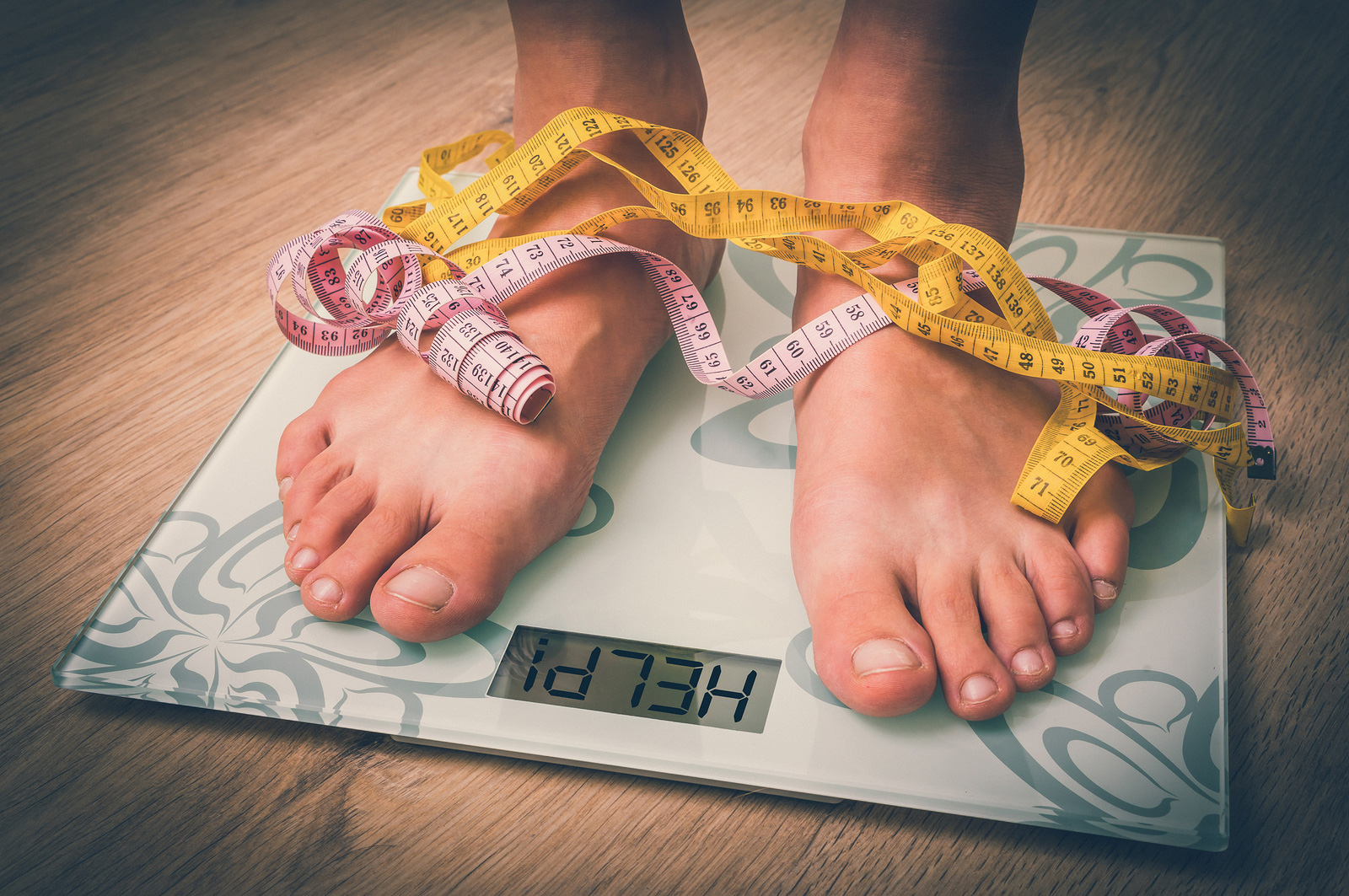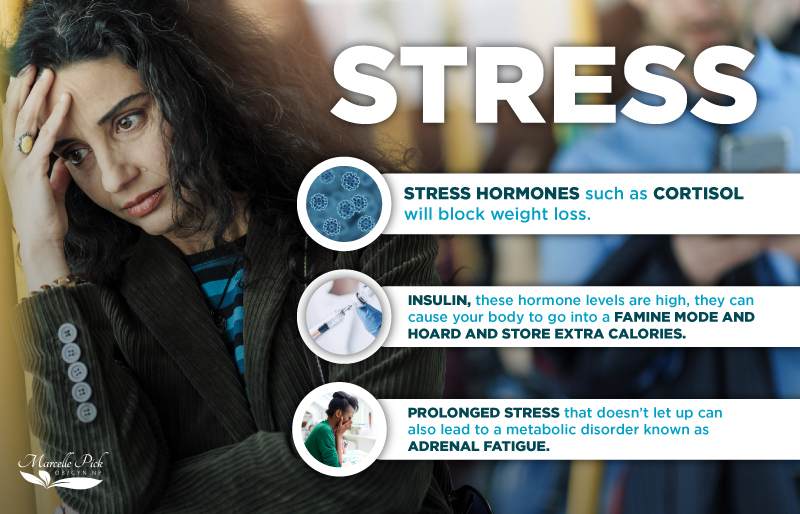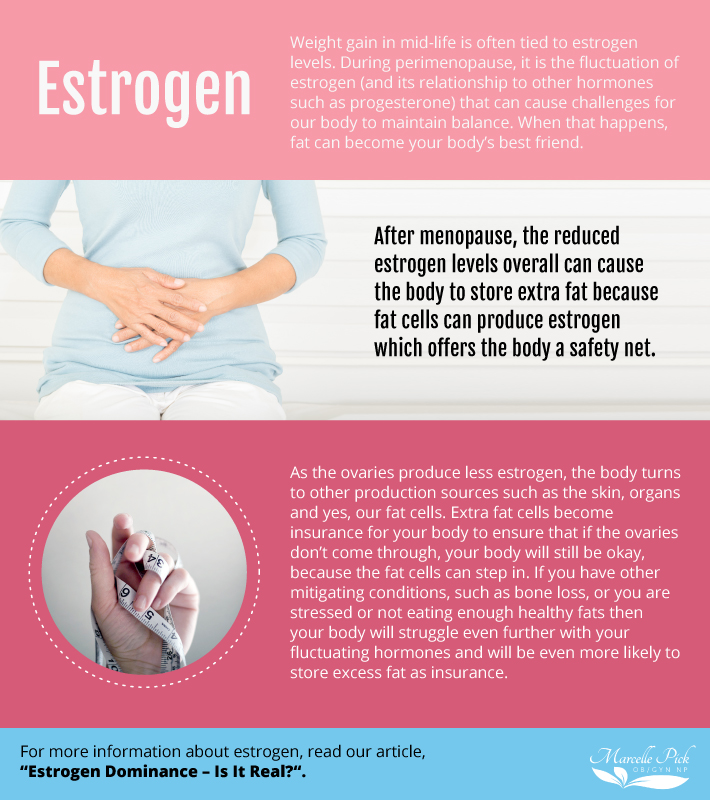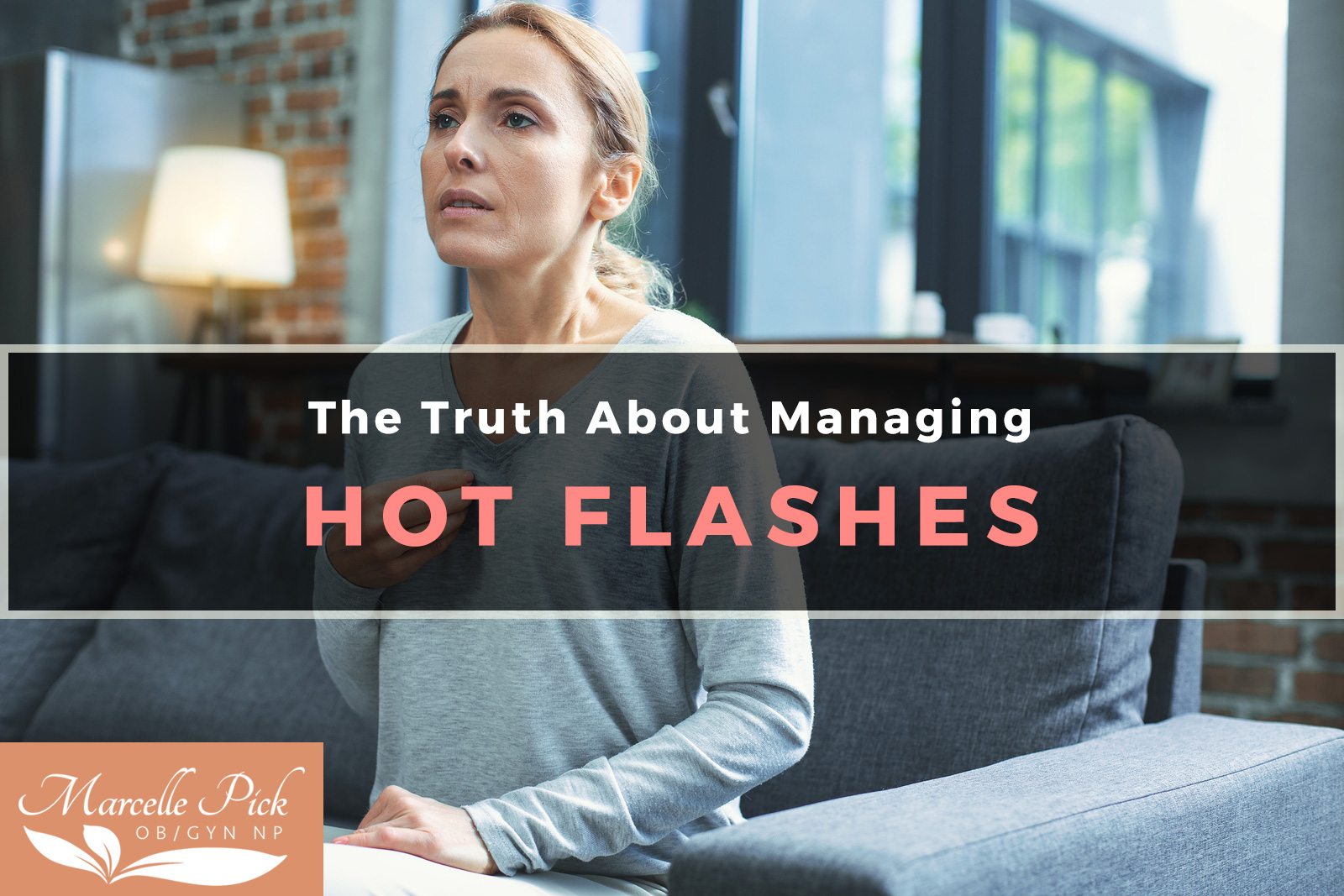When my daughter was three, she was a competitive dancer already, and I admired the strength and power in her little legs. One day, I told her how beautiful I thought her legs were. Her response devastated me! Instead of feeling good about my comment, she replied “No, mommy, they aren’t thin like Barbie’s.”
I had done so much to try and shelter her from the unrealistic images and expectations of American society, but it’s so pervasive that she’d internalized it anyway. I knew then I had so much more work to do. I envisioned a world where my daughter – and every other woman – could accept and love herself just as she is!
It’s not an easy task — women in our culture are conditioned to begin comparing themselves to other women almost from birth. We see the celebrity ideal (much of which is photoshopped) and despair that we’ll never measure up.
One of the great things about getting older is that we finally begin to make peace with our bodies and learn to love them as they are and then BAM! Perimenopause shows up with all its challenges, from hot flashes to headaches to the dreaded weight gain.
Suddenly we find ourselves looking in the mirror wishing we could have our old bodies back. Perimenopausal weight gain is very common; it’s our bodies’ way of adapting and supporting us through the changes that nature intended to occur as we leave our reproductive years behind. But it’s frustrating to suddenly have extra fat where you never have before – especially around the middle where it wreaks havoc on how your clothes look and feel!
Don’t be fooled into thinking that weight gain in perimenopause is inevitable! Weight gain is a symptom of imbalance in your body and with some effort and care, you can maintain — or restore — your ideal weight in perimenopause, menopause and beyond.
Let’s take a look at some of the common factors behind perimenopausal weight gain, then I’ll give you some tips on how you can help your body let it go.
Why Does Perimenopause Often Mean Weight Gain?
I talk to so many women who don’t even realize they’re experiencing perimenopause – but they know they’ve been steadily gaining weight each year. Although menopause is defined as going a full year without menstruation, perimenopause can go on for much longer — often several years! Knowing that can help women understand why it’s getting so much harder to maintain a healthy weight.
Perimenopause is all about fluctuating hormone levels as our bodies prepare for the next stage of life. Our hormones and fat cells are part of a complex and comprehensive network responsible for metabolism, appetite, digestion, heat regulation, and detoxification. Any breakdown in communication along the way will result in symptoms like hot flashes, food cravings, and yes, weight gain.
In order to prevent weight gain, we need to ensure that the network is communicating regularly and effectively. There’s still a lot to learn about the connections between hormones and fat, but research has given us many insights already. We have solid evidence of the many factors that impact our metabolism and body fat. Let’s look at some a little more closely before I give you some strategies for managing your weight in perimenopause.
Insulin Resistance
Insulin controls blood sugar levels, and production is driven by the food we eat. If you eat foods high in sugar, white flour, or highly processed foods, insulin levels spike.
When insulin levels are consistently imbalanced, you can develop a condition called insulin resistance, which means your body can’t properly respond to insulin. That means that even if you have plenty of insulin circulating, you’ll be called on to produce even more, elevating blood glucose levels and resulting in a wide range of uncomfortable symptoms – including weight gain.
When your insulin levels – and consequently your blood glucose levels – are off, your body will convert every calorie it can into fat to be stored. That’s because despite your weight gain, your cells aren’t getting the essential nutrients they need. Your body thinks you’re starving even when you’re overeating!
Related Article: The Destructive Effects of High Cortisol Levels
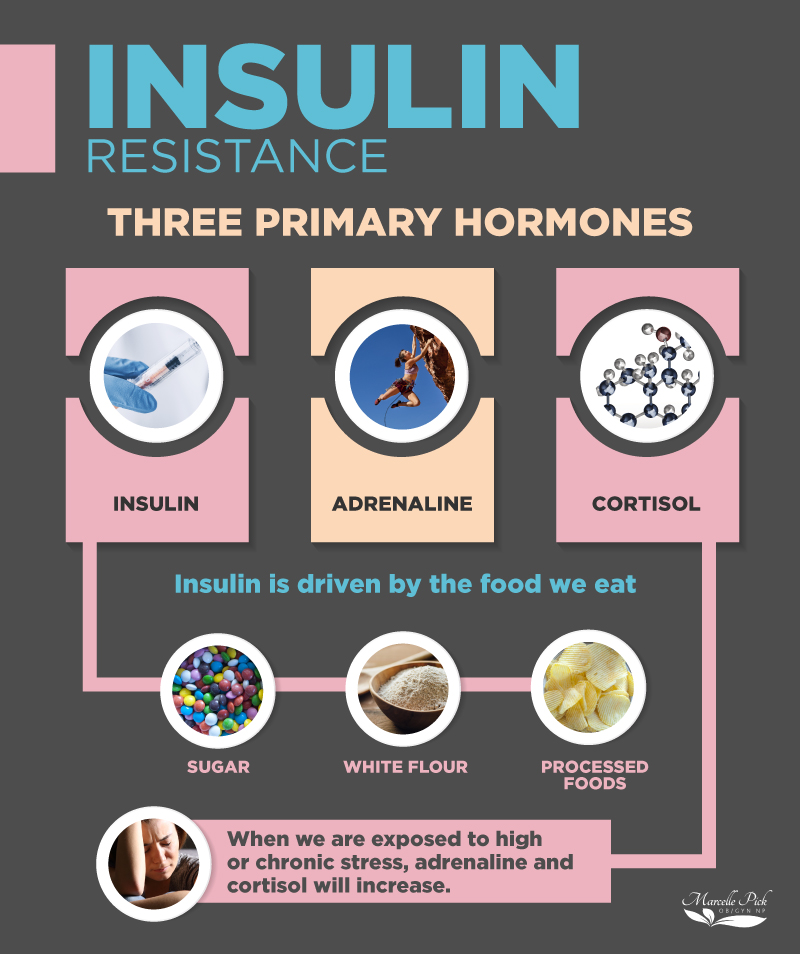
Stress
Two other primary hormones, cortisol and adrenaline, are produced by your adrenals in response to stress – actual or perceived!
I’m sure you know that life can be stressful! Women are pulled in so many directions, and perimenopause can hit right when all that stress is reaching its peak. Children are still young and need guidance, transportation, and tending. Parents are aging and may require more assistance than they used to. Your career is moving full speed ahead. And that’s just the stress you readily recognize. When you add things like yo-you dieting, emotional trauma, undiagnosed food sensitivities, and hormonal imbalances you start to see that stress in non-stop.
And here’s the thing: your body doesn’t know the difference between an actual threat and emotional stress. It all takes a toll, and it all sends your body into survival mode. And when that happens, losing – or even maintaining – weight can be nearly impossible.
When your body is under constant assault by daily stressors, your adrenal system has a hard time keeping up. The more stress your body perceives, the more stress hormones (cortisol and adrenaline) it pumps out. And just like with insulin, when levels of these stress hormones are high, your body will hoard calories, storing them as fat. If your adrenal system is under stress for too long, it can lead to what we call adrenal fatigue, which can also lead to weight gain.
Estrogen
Women often aren’t surprised when I tell them that midlife weight gain could be tied to their estrogen levels. Perimenopause brings fluctuation in estrogen levels, which also impacts other hormones such as progesterone. When ratios between these hormones is skewed, maintaining balance is very difficult.
As production of estrogen in your ovaries declines, your body searches for other sources – including your skin, organs, and your fat cells. Extra fat cells are your body’s insurance policy — if your ovaries don’t come through, your fat cells can step in to keep your body functioning properly.
Related article: Estrogen Dominance – Is It Real?
Toxins
Toxins are all around us, and you don’t have to live in a city to be impacted by these. Research has shown that even people in remote rural areas carry toxins that get stored in their fat cells.
Where do these toxins come from? They’re everywhere! The food we eat, the air we breathe, the products we cook with or store food in, the clothing we wear — the list goes on and on!
It’s impossible to avoid all exposure to toxins. We actually start our lives with chemicals passed into our system from our mothers! And over the course of our lives, we only add to that toxic burden.
A healthy immune system releases these toxins from your body. But if there are any mitigating factors (and I have yet to meet someone who has none!) excess toxins remain in your fat cells.
Not only can these toxins make weight loss difficult, but even if you do manage to lose those unwanted pounds, if you do so too quickly the toxins end up in your system. The release of those toxins can cause symptoms that send your body right back into protective mode, so those pounds come right back.
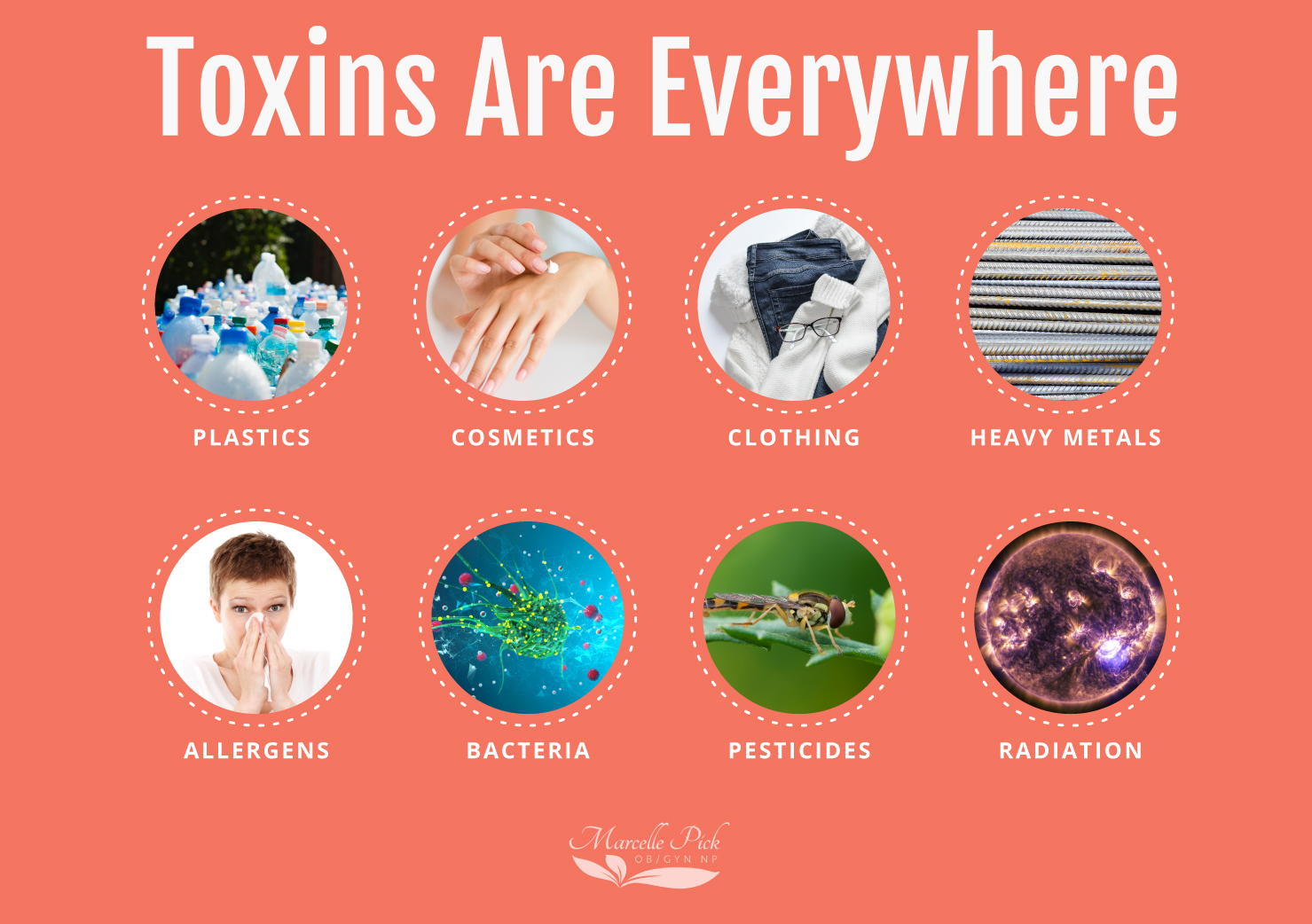
Emotional Eating
In perimenopause, emotions are often shifting along with your hormone levels. Whatever these emotions are, the dramatic changes can often trigger emotional eating patterns. Sometimes, emotional triggers have been at play for a long time and sometimes they’re a new challenge for women to navigate.
Food often evokes memories of happy times that provide comfort and feed our pleasure receptors, so when we have a hard day, an emotional experience, or feel out of balance, food is something that can ground us.
Midlife brings so many complex changes not only to women’s bodies, but also their lives as parents age and children grow. Many women find themselves adrift, wondering how to handle the emptiness, sadness, or uncertainty they’re feeling. they turn to food in ways they never have to try and find a sense of calm or joy.
That’s why it’s so important to pay attention to your core emotions, and address these as well as any other imbalances in your body.
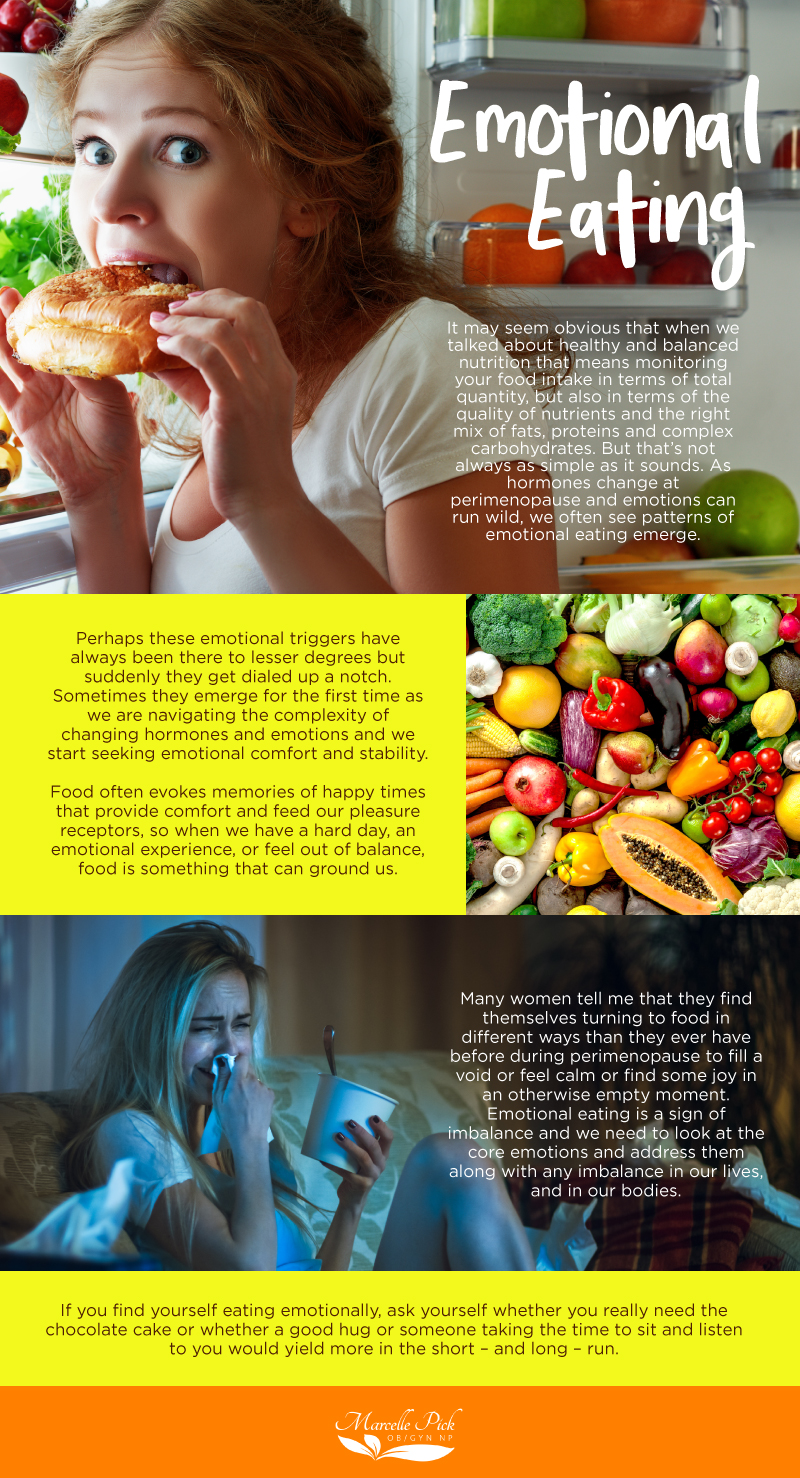
Sleep
Sleep is so important to hormonal balance, emotional stability, and feeling good. Studies show that even one night of poor quality sleep can increase blood sugar levels and impact your sensitivity to insulin. So many vital processes take place while your body is at rest.
Symptoms of perimenopause can disrupt sleep, and consequently impact weight. Multiple studies have revealed the association between weight gain and inadequate sleep.

Self-Acceptance
There’s one last thing I need to mention about perimenopausal weight gain before we talk about strategies for losing weight. When women don’t truly accept themselves for who they are and respect their experiences, weight loss can prove to be very difficult.
Some women have spent their whole lives using extra weight as protection. They use extra weight to hide themselves from the world or even from their feelings about themselves, often without even recognizing it. That’s why so many women lose a significant amount of weight only to gain it right back.
Other women have been thin their whole lives, and struggle as their bodies find a more typical balance in mid-life.
Perimenopause is a time of great reflection. It’s an opportunity to look inward and discover how your internal story is impacting your life – and your weight.
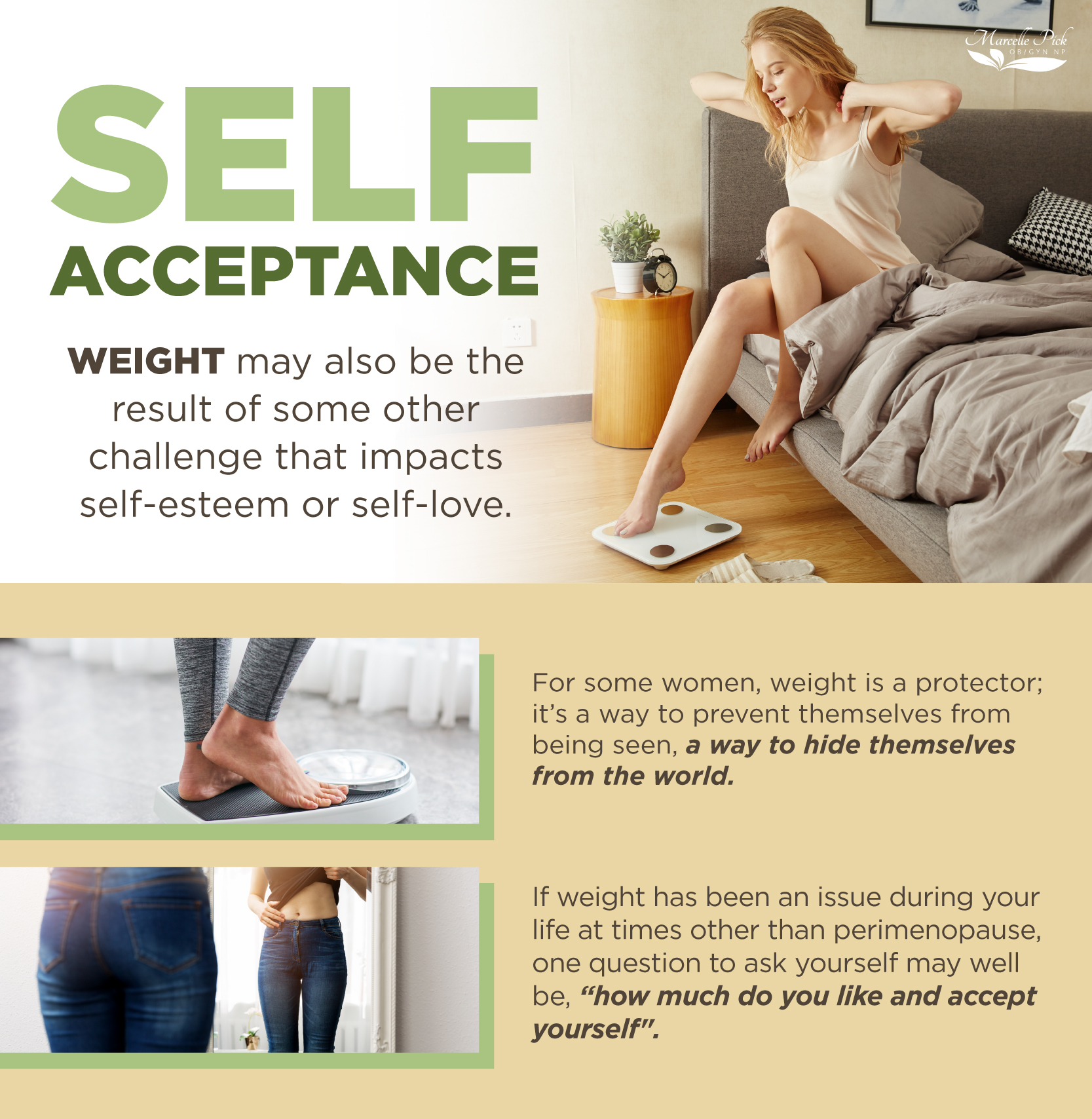
What Can I Do to Maintain a Healthy Weight?
Like I said earlier, although so many factors impact weight in perimenopause, there IS something you can do about it. It takes a commitment to giving your body the support it needs to stay balanced, so it won’t resort to storing fat as a protective measure.
1. Give Yourself Permission to Do Less
This is a perfect time to reassess your to-do list to see what can be dropped. Despite the common perception, you do not have to be everything to everyone. It’s essential that you find time to relax, breathe, and even play a little! If stress has been constant for a long time, your adrenals may need some support to regain balance. I offer a range of adrenal support products, and I can help you find exactly the right one to fit your needs.
2. Drastically Reduce Your Consumption of Sugar and Processed Foods
Sugar is everywhere, so you may be eating far more than you even know. And if you’ve been doing so for a long time, the cumulative effect in your body is severe. Start to read labels and recognize that packaged foods aren’t going to offer the same nutrients that fresh, whole foods give you. Scrambled eggs with fresh vegetables is a much better breakfast choice than a donut or a bagel!
3. Eat Plenty of Protein and Healthy Fat
Protein gives your body the energy it needs and keeps you feeling full longer, which can help you avoid snacking on less nutritious foods. Try to include protein with every meal and snack. And don’t forget the benefit of healthy fat! You need fats for brain and cell functioning and to keep hormones balanced. Avoiding all fat often makes your body actually store the fat it already has!
4. Move with Intention
So many women I talk to think that strenuous exercise – like running or aerobics classes – is the key to weight loss. The truth is, working out too much in the wrong way can actually hinder your ability to lose weight! Of course you need to stay physically active, but both weight training and interval training are more effective ways to maintain a healthy weight and healthy metabolic function.
5. Fill Your Plate with Color
The more variety your diet has, the easier it is to get the nutrients you need. I always tell my patients to “eat the rainbow.” There are so many delicious vegetables and fruits that can be used in new and exciting ways. Challenge yourself to try one new vegetable a week!
6. Take a High-Quality Multivitamin and Other Nutritional Support as Necessary
It is so hard to get all the nutrients your body needs to function properly from food – even if you’re eating whole, fresh foods! Food production methods and soil depleted of nutrients means a lot of our available food simply doesn’t pack the nutritional punch food once had. Especially in times of transition, it’s important to support your body with nutritional supplements to fill in the gaps. Find one now.
7. Try My Successful Weight Loss Program
For those struggling that have tried many things to no avail, you may want to consider the weight loss program that I have, using homeopathic drops, for fast and consistent weight loss. Click here to learn more.
The Choice is Yours – How Will YOU Experience Perimenopause?
We can’t avoid growing older, and perimenopause will hit, maybe sooner than you realized. But you don’t have to throw up your hands and accept changes you don’t want – like weight gain. Be proactive, make a commitment to yourself, and choose another way! You can change the course you’re on at any moment and learn to maintain a healthy, happy body (and mind) throughout menopause and beyond!


